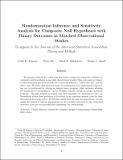Randomization Inference and Sensitivity Analysis for Composite Null Hypotheses With Binary Outcomes in Matched Observational Studies
Author(s)
Shi, Pixu; Mikkelsen, Mark E.; Small, Dylan S.; Fogarty, Colin B
Download2ae0b4c34e51135549e333971eb0c909ce62.pdf (717.6Kb)
OPEN_ACCESS_POLICY
Open Access Policy
Creative Commons Attribution-Noncommercial-Share Alike
Terms of use
Metadata
Show full item recordAbstract
We present methods for conducting hypothesis testing and sensitivity analyses for composite null hypotheses in matched observational studies when outcomes are binary. Causal estimands discussed include the causal risk difference, causal risk ratio, and the effect ratio. We show that inference under the assumption of no unmeasured confounding can be performed by solving an integer linear program, while inference allowing for unmeasured confounding of a given strength requires solving an integer quadratic program. Through simulation studies and data examples, we demonstrate that our formulation allows these problems to be solved in an expedient manner even for large datasets and for large strata. We further exhibit that through our formulation, one can assess the impact of various assumptions about the potential outcomes on the performed inference. R scripts are provided that implement our methods. Supplementary materials for this article are available online. Keywords: Causal inference; Causal risk; Effect ratio; Integer programming; Sensitivity analysis
Date issued
2017-05Department
Sloan School of ManagementJournal
Journal of the American Statistical Association
Publisher
Taylor & Francis
Citation
Fogarty, Colin B. et al. “Randomization Inference and Sensitivity Analysis for Composite Null Hypotheses With Binary Outcomes in Matched Observational Studies.” Journal of the American Statistical Association 112, 517 (January 2017): 321–331 © 2017 American Statistical Association
Version: Author's final manuscript
ISSN
0162-1459
1537-274X